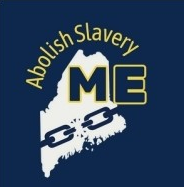FAQs
Q: What are exception clauses? How many states currently have them? Does Maine have one?
A: Exception clauses are legalized exemptions to the constitutionally protected human rights against enslavement and involuntary servitude. Though commonly associated exclusively with the 13th Amendment of the US Constitution, eighteen states, as well as Washington D.C. and Puerto Rico, have them. Maine is one of twenty five states without an exception clause.
Q: Wasn’t slavery abolished in the United States in 1865 with the end of Civil War and the passage of the 13th Amendment?
A: No. As legal and labor historians have demonstrated, the post-Civil War period in the US resulted in systems of intense racist exploitation and that were, in fact, worse than those preceeding them.
Q: Why amend state constitutions? Isn’t this a policy issue?
A: Slavery and involuntary servitude are internationally recognized crimes against humanity from which US citizens deserve the highest level of legal protection.
Q: How do slavery abolitionists differ from other contemporary abolitionists such as prison and police abolitionists?
A: For slavery abolitionists, enslaving differs fundamentally from imprisoning and policing, which are symptons of the greater problem.
